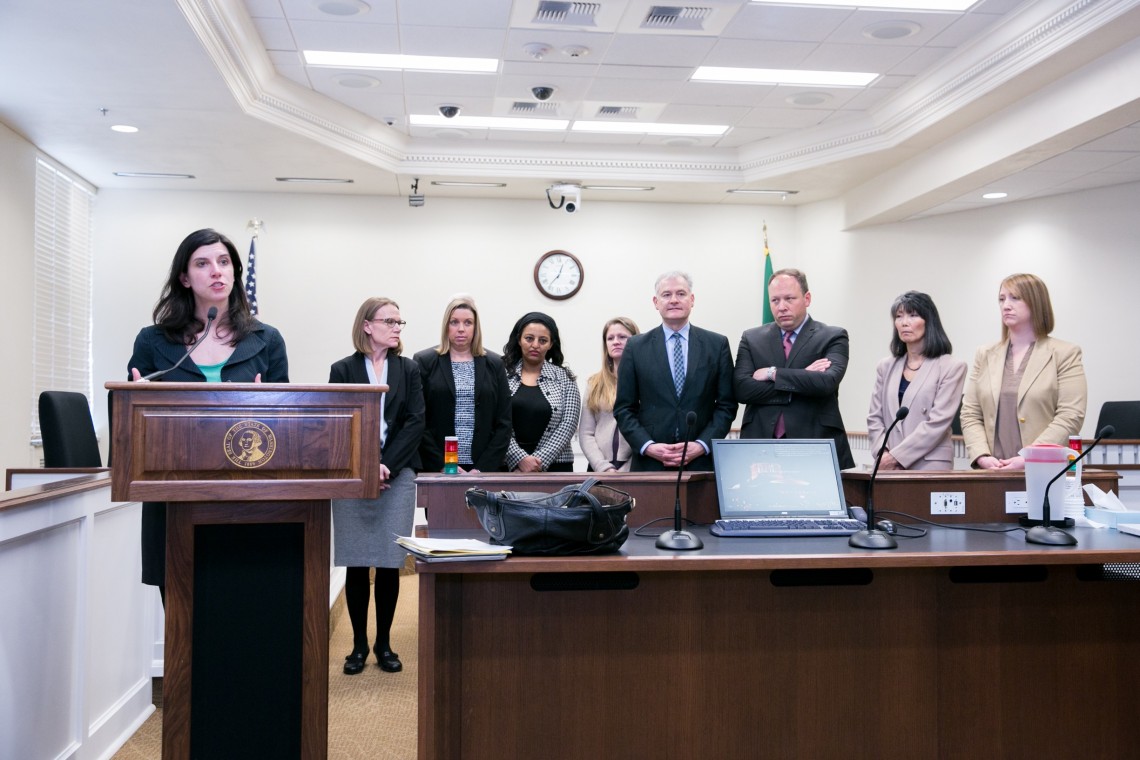Legislative News from Representatives Jessyn Farrell (D-Seattle, 46th LD), Gerry Pollet (D-Seattle, 46th LD), Sharon Tomiko Santos (D-Seattle, 37th LD), and Senator Jamie Pedersen (D-Seattle, 43rd LD)
January 26, 2016
Seattle legislators announce package of education bills for this year
OLYMPIA – A group of Seattle legislators came together today to promote a package of bills that would make sure every kid gets a fair shot at an excellent education. The package addresses some of Seattle School District’s most urgent problems. These bills support the work being done to fully fund education statewide.

Photo courtesy of Washington State Legislative Support Services
“These proposals, together with what the House passed this week, will make a real difference for students in Seattle Public Schools,” said Rep. Jessyn Farrell (D-Seattle). “As Democrats, we believe this is a very important session for education, not a do-nothing session.”
The legislators want to focus on four key areas: capacity for students; recruitment of teachers; accountability for school district decisions; and closing the opportunity gap.
“Seattle has experienced dramatic enrollment growth over the last six years and needs assistance to provide classroom space required both by enrollment growth and class size reduction laws,” said Senator Jamie Pedersen (D-Seattle), prime sponsor of SB 5859. “This bill will increase the state’s contribution to school construction, helping Seattle and school districts across the state build the classrooms needed to educate kids.”
“We have a teacher shortage crisis. Teachers are leaving the profession at alarmingly high rates and there aren’t enough new teachers to lower class sizes” said Rep. Gerry Pollet (D-Seattle), prime sponsor of HB 2881. “This teacher shortage and new teacher recruitment bill will allow us to lower class sizes and mentor teachers. It will expand Seattle’s successful residency mentor program for first year teachers, and provide hundreds of tuition grants for students who want to become teachers.”
“As the Seattle School District decides how to implement class size reductions, these decisions need to consider the impacts to all students in the district,” said Farrell, prime sponsor of HB 2837. “In a school district as big as Seattle, there can be shuffling of teachers and students around to meet class size reduction mandates. But these actions should not create smaller class sizes for some students while others see their classrooms ballooning. House Bill 2837 will foster transparency and accountability with respect to decisions around class size and teacher allocation.”
“Our current public education system is designed with a one-size-fits-all approach,” said Rep. Sharon Tomiko Santos (D-Seattle), prime sponsor of HB 1541. “But we know every child is different. One size does not fit all. It’s our paramount duty as a state to provide each student with the unique and integrated supports they need to achieve academic excellence and success. The best way to accomplish that goal for every child is to close the educational opportunity gap.”
“We will continue our efforts to secure state funding to reduce the horrible overcrowding in Seattle’s schools,” said Pollet.
The delegation has secured over $40 million in the past several years to reopen and renovate overcrowded and unsafe schools in Seattle, and Senators Carlyle, Pedersen and Rep. Pollet are working with the District to develop a new package of targeted investments.
Other bills being highlighted by the group include:
- SB 6298 (Senator Frockt) – This bill will help kids attend schools closer to where they live. Time spent in transit makes it difficult for a student to study and participate in activities at their school, and has a negative effect academically and socially.
- SB 6259/HB 2851 (Senator Carlyle/ Rep. Frame) – This measure will give large school districts the ability to pay school board directors a salary. Paying board directors will allow school districts to recruit and retain quality leaders, with more diversity, who may not be able to serve as a full time volunteer.
- HB 2868 (Rep. Tarleton) – Jobs in the maritime sector are a path to the middle class. Tens of thousands of workers with specialized skills in the maritime trades will be needed in our state in the coming decade. This bill will substantially expand student access to high school career and technical education opportunities in STEM fields. It will also align credits earned in high school so that students enter the community and technical colleges ready to complete apprenticeships, certifications, or accreditations in the maritime and manufacturing.
